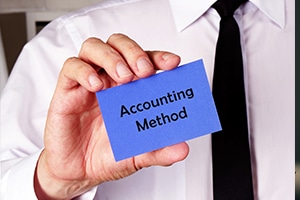
Posted Friday, November 3, 2023
Many business owners ask if they should be cash or accrual when selecting the accounting method within their accounting platform such as QuickBooks Online. Simply put, the accrual-basis method recognizes revenue when earned (not when paid) and recognizes expenses when obligated to pay (but not necessarily paid). Conversely, the cash-basis method recognizes revenue when cash is received and recognizes expenses when cash is paid (mailing a check on 12/31 or swiping your credit card on 12/31 is considered paid in the current year).
There is also a modified cash-basis method of accounting for those who have inventory where generally you are using cash-basis for recording transactions but record all inventory transactions using accrual-basis. Which method should you use?
Yes, there are all kinds of exceptions, rules, thresholds, etc. and other nauseating details. Let’s skip those now. Most small businesses can operate just fine using the cash-basis method of accounting; when cash comes in, it’s revenue. When cash leaves, it is usually an expense or a shareholder distribution (or loan payment or capital expenditure on a monster truck for the office). Easy.
Phantom Income
Cash-basis method also prevents phantom income or paying taxes on bad income. What do we mean?
If you send an invoice on 12/31 but the client never pays, and you forget this, you will pay taxes on phantom income. Or, you send an invoice for $10,000 on 12/31 but the client only pays $6,000 on 7/1 because of a negotiated write-down; you paid taxes on $10,000 and now you must wait until the following year to recognize the $4,000 bad debt expense and subsequent reduction in taxable income. $4,000 times your tax rate might not be a big deal; $40,000 times your tax rate might be a killer since you didn’t get the cash to pay the taxes.
Another scenario is where you invoice a client on 12/31 but because of norms in the industry, they don’t pay for six months. If this is a large invoice you will have fronted the taxes generated by it on April 15 but not get paid until July 1. That can really suck the cash out of your flow.
Cash-basis method of accounting takes the mystery out of this stuff.
Bad Debts in Cash World
One question we get all the time… literally all the time… “I built a website for this dude and he never paid me. Can I deduct the amount he owes me?” It depends. If you are cash-basis then No since you never recognized the income nor paid taxes on it. If you are accrual-basis where you invoiced the dude and recognized the income as taxable, then Yes. To recap, you can only deduct a bad debt if you previously recognized the income, dude or no dude.
Here is another example to hopefully take this home. You are a landlord. Your property is vacant for two months; your taxable rental income is naturally reduced by this vacancy and as such creates a built-in tax reduction (not deduction… reduction… with an r).
Keep in mind that over time accrual-basis and cash-basis converge for most small businesses that are stable and not growing. From year to year things might be different, but after a decade or more, historical net income is virtually identical between accrual and cash. Sure, there are probably extreme and rare examples where this statement fails, but generally speaking it holds.
Accruals in Cash World
There are some nuances that we must take care of in a cash-based world. Four scenarios tend to repeat themselves often-
- You intend to make a 401k employer contribution by March 15. Cash hasn’t left the checking account yet, however, you want to deduct the 401k contribution on your tax return. We would record the 401k Contribution expense (debit) with a corresponding 401k Liability (credit).
- You swipe your credit card for a bunch of expenses in December. You pay the credit card bill in January. The IRS, and the accounting industry, says you can recognize these expenses at the time of credit card swipe. However, cash has not left your checking account by December 31. As such, we record the expenses (debits) with a corresponding Credit Card Payable (credit).
- Your client, on the advice of their smart CPA, sends you a check on December 31 and you receive it on January 2. The 1099-MISC that is issued to you also includes this payment. We align top-line revenue with the total of all 1099s received, and then record a “timing difference” so that part of this revenue is not recognized as taxable income.
- You are part of a multi-entity arrangement where the mothership pays out a fee for service to the baby S Corps. However, December 31 comes and goes, and the final year-end accounting (bookkeeping) has not been done until February. Since the obligation existed on December 31, we record a Fee for Service expense (debit) and corresponding Payable (credit) so that net business income (profit) is reduced correctly.
Wanna Talk About Your Small Business?
Please use the form below to tell us a little about yourself, and what you have going on with your small business or 1099 contractor gig. WCG CPAs & Advisors are small business CPAs, tax professionals and consultants, and we look forward to talking to you!

